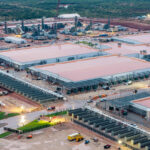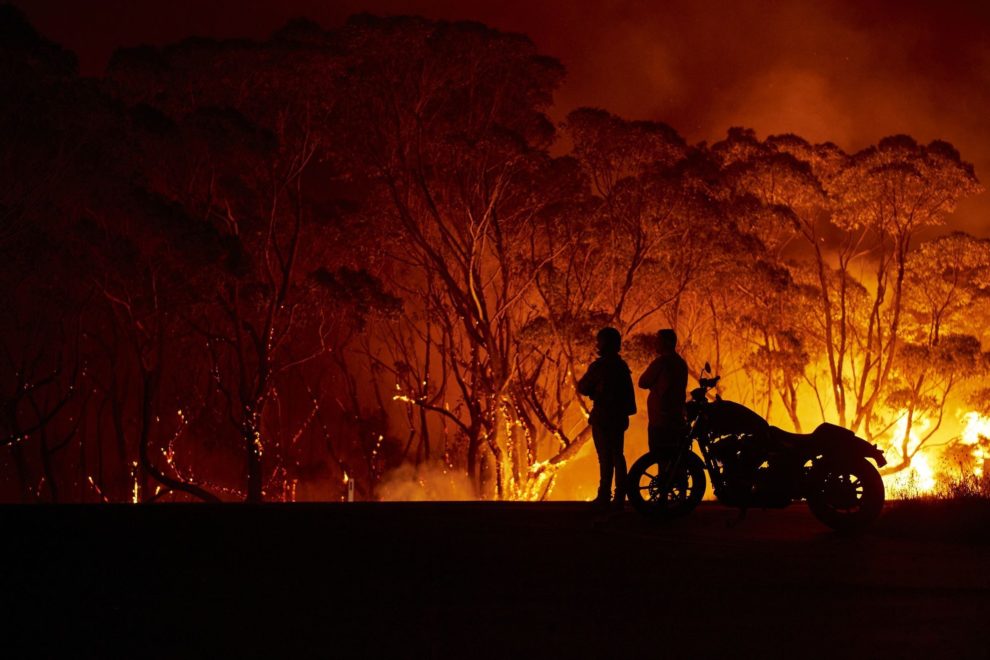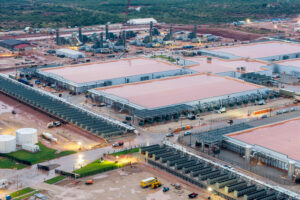
(Bloomberg) — Authorities are assessing mass property damage across southeastern Australia after searing temperatures and strong winds fanned catastrophic wildfires Saturday in one of the worst days of the weeks-long crisis.
Milder weather, including patchy rain, across southeastern Australia has brought some relief, though firefighters continue to battle two “emergency-level” blazes in New South Wales and four in Victoria, hampered by flame-fanning wind gusts, authorities said Sunday.
Dozens of communities, from small towns on the south coast of New South Wales, to alpine villages in neighboring Victoria state, faced extreme conditions as fires grew so large they generated dry thunderstorms.
Thousands of people, including tourists, had heeded the advice of authorities and evacuated a 350-kilometer (217-mile) stretch of coastline as well as dangerous inland areas over the past few days to escape the intensifying infernos. But many remained, hosing down their properties to protect against falling embers as they anxiously waited to see if the winds would blow the fire front in their direction.
Australia Fire Maps: Where the Devastating Wildfires Are Burning
Two people died in wildfires that have destroyed more than a third of South Australia’s Kangaroo Island, devastating the national park and farmland and severely damaging the luxury Southern Ocean Lodge resort. Penrith, on the outskirts of Sydney, reached a record 48.9 degrees Celsius (120 degrees Fahrenheit) Saturday, symbolic of the dangerous weather conditions that have fanned ferocious flames and sparked new blazes further south.
Prime Minister Scott Morrison announced Saturday an unprecedented level of military support to boost firefighting and recovery efforts as the national death toll from four months of infernos rose to 23.
A video set to electronic music posted on Morrison’s Twitter and Facebook accounts outlining the additional measures sparked thousands of comments. Many praised the deployment of as many as 3,000 army reservists, while others, including the Australia Defence Association, lambasted the 50-second clip, which spawned mocking renditions.
Morrison told reporters Sunday that the video was produced to “communicate as simply and helpfully” as possible what the government is doing to help people.
Australia’s Wildfire Crisis: Key Numbers Behind the Disaster
Here’s the latest (all times local):
Eden threatened (2:04 p.m.)
Massive wildfires that crossed the Victorian border are encroaching the coastal town of Eden in southeast New South Wales, prompting warnings from authorities for those remaining there to leave.
Dozens of people had sought shelter on Eden’s wharf, but police say that area is no longer safe, ABC reported. The Rural Fire Service said people in the town should seek shelter in a solid structure and enact their fire plans.
The Royal Australian Navy’s HMAS Adelaide is stationed offshore with some 400 personnel to aid relief efforts.
Energy impact (1:17 p.m.)
Extensive wildfire activity in the Snowy Mountains region of New South Wales has hindered electricity supplies, the state’s Department of Planning, Industry & Environment said in a statement.
The Australian Energy Market Operator, TransGrid, and state and territory governments are working closely to keep power supplies on, but weather conditions Sunday may cause power to be turned off in parts of the network ahead of peak evening demand.
New Zealand aid (12:40 p.m.)
New Zealand will send three helicopters and crew and two army combat engineer sections to Australia as part of additional support for wildfire-fighting efforts, Defense Minister Ron Mark said.
The New Zealand contingent will deploy in the coming week to the Royal Australian Air Force’s Edinburgh based in Adelaide, South Australia, and will remain in Australia at least until the end of January, Mark said in a statement Sunday.
Fire Emergencies (12:30 p.m.)
Firefighters are battling 48 blazes across Victoria state, including two that represent a severe threat, the state’s Emergency Management Commissioner Andrew Crisp told reporters in Melbourne.
Some 900,000 hectares (2.2 million acres) have been razed, mostly in the state’s East Gippsland region. Seven people are unaccounted for in the state, which has maintained “disaster” footing to heighten the political response to the crisis, which Crisp described as “dynamic” and “dangerous,” even as cooler weather and rain helped quell the firefronts.
Recovery agency (11:30 a.m.)
Australia will mount a national recovery agency to run for two years to support the health and well-being of people affected by the wildfires, Morrison told reporters in Canberra. The government’s midyear budget projections are still on track even with the additional fire-fighting costs, he said.
The government is calling for helicopter support from allies to help combat the wildfires, Defense Minister Linda Reynolds said during the briefing.
Losses mount (11:08 a.m.)
The Insurance Council of Australia estimates fire-related losses at A$375 million ($260 million) from 5,850 claims received so far. It’s the “widest ranging bushfire catastrophe that we have ever declared,” Campbell Fuller, a spokesman for the council, told ABC television.
Assessments of property damage from Saturday’s inferno are expected to be tallied later Sunday.
Milder weather (8:15 a.m.)
Milder conditions in New South Wales are providing some relief after a “very long night for many residents,” New South Wales Premier Gladys Berejiklian told reporters in Sydney.
No one is unaccounted for in the state. Authorities may have estimates of the extent of property damage as early as Sunday afternoon, she said.
Almost 150 “volatile, dynamic” fires are still blazing across the state, Rural Fire Service Commissioner Shane Fitzsimmons said, after the service’s second-busiest day.
“It was an awful day yesterday, a very difficult day,” Fitzsimmons said, adding that hot weather forecast later in the coming week may bring more fires.
Property losses will run into the “hundreds,” he said. Four firefighters were injured battling blazes in New South Wales, and a 47-year-old man died from a cardiac arrest after aiding efforts.
Property damage (7:30 a.m.)
Communities are bracing for news of property damage and loss early Sunday after another long night for firefighters. Southern New South Wales was ablaze into the early hours, with two emergency-level fires burning, including in the Bega Valley, near Victoria’s northeastern border.
Cooler weather and light rain across parts of eastern Victoria has provided some relief and enabled firefighters to reduce the number of emergency-level fires to 4 from 17.
‘Atomic bomb’ (5 a.m.)
Officials issued new emergency warnings for bushfires that hit communities including Buldah, Cann River and Club Terrace in Victoria, saying it’s too late to leave. Hours earlier, residents of Dandongadale and Nug Nug were advised to evacuate immediately.
At midnight, the fire service in New South Wales said the threat is “still not over” with seven fires at emergency warning and 11 labeled watch and act. A statewide total fire ban remains in effect for Sunday.
“This is not a bushfire,” New South Wales Transport Minister Andrew Constance told ABC radio. “It’s an atomic bomb.”
–With assistance from Edward Johnson and Ben Bartenstein.
To contact the reporter on this story: Jason Gale in Melbourne at [email protected]
To contact the editors responsible for this story: Shamim Adam at [email protected], Virginia Van Natta
<p class="canvas-atom canvas-text Mb(1.0em) Mb(0)–sm Mt(0.8em)–sm" type="text" content="For more articles like this, please visit us at bloomberg.com” data-reactid=”94″>For more articles like this, please visit us at bloomberg.com
©2020 Bloomberg L.P.










